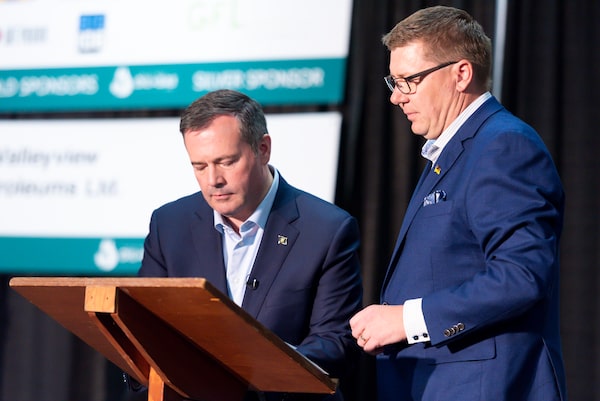
The Council of the Federation, which includes all the premiers and territorial leaders, will hold a conference call Friday to discuss Mr. Kenney’s request for a first ministers meeting.Michael Bell/The Canadian Press
Alberta Premier Jason Kenney is calling for a first ministers meeting soon to discuss completing the Trans Mountain pipeline expansion and says the incoming minority Liberal government – which lacks MPs in his province – can always phone him and his ministers to address Western alienation.
In an interview with The Globe and Mail on Thursday, Mr. Kenney said the best way for Prime Minister Justin Trudeau to resolve tensions within the federation is to deal directly with him and Saskatchewan Premier Scott Moe.
“If the federal government wants to know what Alberta is thinking, they have got my number. If they want to know what Saskatchewan is thinking, they have Scott Moe’s number,” he said. “We have two provincial governments here, both of them elected with super majorities, who according to the polling are two of the most popular provincial governments in Canada.”
Mr. Kenney wants a meeting of premiers, territorial leaders and the Prime Minister soon after Mr. Trudeau unveils a new cabinet on Nov. 20 to discuss urgent issues such as finishing the Trans Mountain pipeline expansion project, an improved deal on equalization payments and the creation of “energy corridors” in Canada that would allow pipelines to be built without undue obstacles.
“I actually believe on most of the issues that animate Albertans right now we have almost all or most of the provincial or territorial governments lined up in various ways,” he said.
The Council of the Federation, which includes all the premiers and territorial leaders, will hold a conference call Friday to discuss Mr. Kenney’s request for a first ministers meeting.
B.C. Premier John Horgan said he expects Western alienation to be a key topic on Friday.
Mr. Horgan noted that British Columbia’s political map looks far different from that of the other Western provinces, with federal Liberals, Conservatives, New Democrats and Greens elected across his province on Oct. 21.
“The notion that the West is being shut out, I disagree with that. That does not diminish the sense of frustration and alienation in Alberta particularly, and also recently in Saskatchewan, but people make their choices when they vote and I hope that we, the further we get away from Election Day, the further away we will be from the partisan hectoring that comes with this notion of being alienated,” he told reporters in Victoria on Thursday.
Mr. Kenney also warned that Western Canadian alienation will continue to deepen unless the minority Liberal government guarantees the completion of the Trans Mountain expansion and repeals or at least substantially rewrites Bill C-69, legislation the Premier says will frustrate the building of any more pipelines to coastal waters.
Bill C-69, the Impact Assessment Act, was given royal assent in June and sets up a new authority to assess the impact of major infrastructure projects such as pipelines, mines and interprovincial highways.
Mr. Kenney said the legislation “creates profound uncertainty about getting any major investments or projects approved. We see this … as part of a larger-term effort by many in this government to effectively phase out the oil sands.”
The Alberta Premier spoke shortly after Calgary-based Encana Corp. announced it would move its headquarters to the United States. A spokeswoman for federal Natural Resources Minister Amarjeet Sohi said Ottawa was “disappointed to hear the news.” Press secretary Vanessa Adams noted Encana chief executive Doug Suttles had said the move would not affect employment levels or investments in Canada.
Ms. Adams said Alberta is a key driver of Canada’s economy and the government realizes the energy sector has been weathering a “very challenging time.” She said the Liberal government has been focused on creating the conditions to attract new investment including adding pipeline capacity to get petroleum to markets, including the Trans Mountain pipeline, which Ottawa purchased last year to keep the expansion on track.
She said Ottawa had introduced better rules for reviews to ensure “good projects can be approved.” She noted the government had also secured a $40-billion liquefied natural gas project in Kitimat, B.C., to expedite sales to Asia. “And there are hundreds of other major resource projects planned across Canada over the next 10 years.”
Mr. Kenney said he wants a guarantee from Ottawa that the Trans Mountain expansion will be completed – to stave off any chance that the Liberals might agree to stall or cancel the project to win New Democrat or Bloc Québécois support so it can survive budget or confidence votes.
The Premier is also campaigning for a new fiscal arrangement for his province and has vowed to hold a referendum on the matter unless concerns are addressed. He says Alberta is paying far more in federal taxes than it receives back in transfers and benefits, saying Albertans made a roughly $20-billion contribution annually to the federation in each of the past five years even as it has been suffering from economic hardship.
“The basic rules of the federation are profoundly unfair to this province.”
He said one measure Ottawa could take would be to lift the per-capita cap on what’s called the fiscal stabilization program, so that $1-billion more in annual payments could flow to Alberta. He described the program as an equalization rebate to “have" provinces, those that don’t receive equalization payments, when they experience a sudden and precipitous decline in revenue.
He said Alberta would use this money to create “green jobs."
Our Morning Update and Evening Update newsletters are written by Globe editors, giving you a concise summary of the day’s most important headlines. Sign up today.
 Steven Chase
Steven Chase Robert Fife
Robert Fife Justine Hunter
Justine Hunter